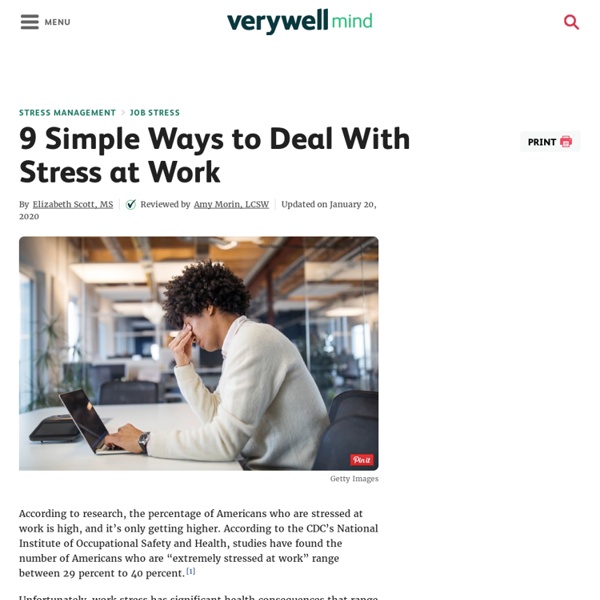Quiz: Are You Too Stressed Out at Work?
Credit: bleakstar/Shutterstock Stress can come from many different aspects of your life, and a little stress now and then is totally normal. But if you're feeling stressed out all the time because of your job, you might need to re-evaluate your career.
16 Simple Ways to Relieve Stress and Anxiety
Stress and anxiety are common experiences for most people. In fact, 70% of adults in the US say they feel stress or anxiety daily. Here are 16 simple ways to relieve stress and anxiety.
Finding Meaning Can Protect Against Stress
There’s plenty not to like about stress. The worrying. The tension. The not being able to relax and enjoy yourself.
Best ways to manage stress
Goal setting and relaxation techniques reduce stress and ease the physical and emotional burdenit can take. Stressful experiences come in many forms, such as a demanding job, a chronic disease, or an argument with a loved one. But all types of stressors—even stress from positive experiences,such as planning a party—can result in the same physical and emotional burden on health, especially when you're an older adult. "As we age, our immune systems are less efficient, and adding stress to that can lead to disease progression or the onset of disease," says Dr. Ann Webster, a health psychologist at the Benson-Henry Institute for Mind Body Medicine at Harvard-affiliated Massachusetts General Hospital. The stress response
Coping one day and crying the next: Work-related burnout is real
SINGAPORE: One day at work, Ms Jamuna Raj was striking off “to-dos” from a neat hand-written list, thinking she had a lid on all her tasks at work. But the next day, she was bawling when her boss asked her if she was okay. The 31-year-old, who was handling multiple roles in client management, events, editorial management and production in a small publishing house, did not know what sparked it, but it was the start of her journey towards realising that she was experiencing burnout. “I was striking the to-dos off, but for every one that I did, there were five more.
Coping with stress: Workplace tips
Coping with stress: Workplace tips Job stress can be all-consuming — but it doesn't have to be. Address your triggers, keep perspective and know when to seek help. By Mayo Clinic Staff The workplace is a likely source of stress, but you're not powerless to the effects of stress at work.
The Science Behind Student Stress
A new study finds that when students experience an academic setback such as a bad grade, the amount of cortisol—the so-called stress hormone—in their bodies typically spikes. For most students it drops back down to normal levels a day later, but for some it stays high. These students remain fixated on the setback and have difficulty moving forward.
Coping with stress at work
Everyone who has ever held a job has, at some point, felt the pressure of work-related stress. Any job can have stressful elements, even if you love what you do. In the short-term, you may experience pressure to meet a deadline or to fulfill a challenging obligation. But when work stress becomes chronic, it can be overwhelming — and harmful to both physical and emotional health. Unfortunately, such long-term stress is all too common.
Burnout Self-Test
© iStockphotoAVTG Are you at risk of burning out? Burnout occurs when passionate, committed people become deeply disillusioned with a job or career from which they have previously derived much of their identity and meaning. It comes as the things that inspire passion and enthusiasm are stripped away, and tedious or unpleasant things crowd in.
Best and Worst Ways to Cope With Stress
Worst: Eat your feelings Like alcohol or drugs, food often becomes a crutch when coping with difficult times. Soothing your pain with high-calorie, high-sugar, or high-fat comfort foods feels good at first, but it can quickly spiral out of control when your mind and body begin to associate negative emotions with eating.




This webpage basically gives us some tips we can deal with stress. Managing stress is not just about implementing techniques but also about having self-awareness of what we are feeling and being aware of our environment as there are things around us that might unknowingly be causing us stress. Being able to have an eye on it can help manage our stress and be more effective. by celestinetan Mar 22
These tips are healthy and simple suggestions for working adults to deal with stress on a daily basis and can be done anywhere and anytime as it does not require much effort. by balanparameswari Mar 20